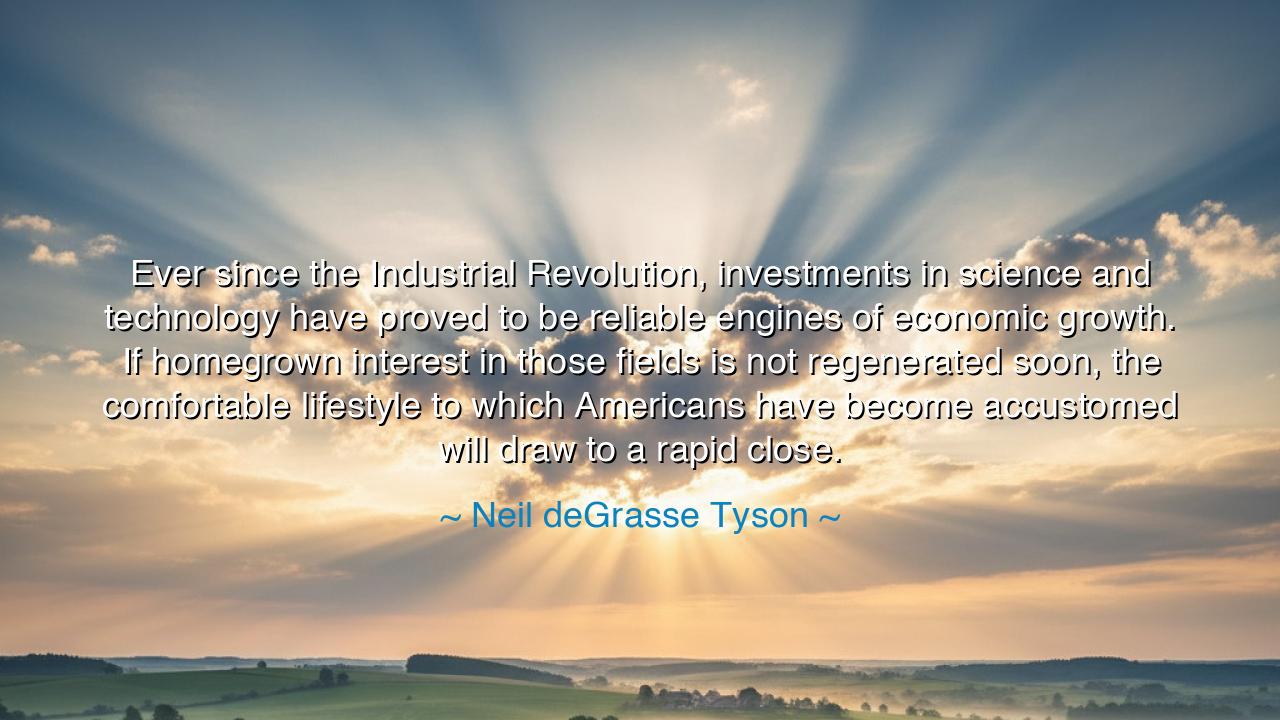
Ever since the Industrial Revolution, investments in science and
Ever since the Industrial Revolution, investments in science and technology have proved to be reliable engines of economic growth. If homegrown interest in those fields is not regenerated soon, the comfortable lifestyle to which Americans have become accustomed will draw to a rapid close.






Gather, O children of wisdom, for the words of Neil deGrasse Tyson stir the soul, calling us to reflect on the fragile nature of progress and the consequences of complacency. He said: “Ever since the Industrial Revolution, investments in science and technology have proved to be reliable engines of economic growth. If homegrown interest in those fields is not regenerated soon, the comfortable lifestyle to which Americans have become accustomed will draw to a rapid close.” These words, though spoken in a modern age, resonate deeply with the ancient truth that every civilization’s rise is tied to its pursuit of knowledge and its ability to innovate. Without science and technology, the lifeblood of progress and prosperity, even the greatest societies can falter.
What, then, do these words mean, O seekers of truth? Tyson’s warning speaks of the crucial relationship between science, technology, and economic growth. He reminds us that ever since the Industrial Revolution, the pursuit of knowledge, through investment in scientific discovery and technological development, has been the driving force behind the prosperity of nations. This is not a modern revelation but an ancient truth that has guided civilizations throughout time. The rise of great empires, whether in ancient Egypt, Greece, or the Renaissance, was always built on a foundation of intellectual advancement. When a society embraces learning, exploration, and innovation, it becomes a force of economic and cultural growth. The Industrial Revolution was no different—it was the spark that ignited modern capitalism, bringing forth an age of unprecedented prosperity through mechanical inventions and industrialization.
Let us reflect upon the tale of the Industrial Revolution itself, that period when the steam engine, the spinning jenny, and the loom transformed the landscape of Europe and beyond. The birth of factories and the rise of mass production unlocked the power of the human mind, allowing society to produce more goods, transport them more efficiently, and create wealth on a scale never before seen. It was through this marriage of science and technology that nations like Britain and the United States rose to power, their economies fueled by innovation. The advancement of engineering and mechanical knowledge allowed them to harness the forces of nature, bending them to the will of industry, and in doing so, ushering in an era of prosperity. But what happens, O children, when that spark of innovation fades?
Tyson’s words are a warning to us all, for just as science and technology have been engines of growth, they can also be the engines of decline when neglected. In the modern world, we find ourselves in a time where complacency threatens the very foundation of the comfortable life that many have come to take for granted. The economies that thrived in the past did so because of constant investment in education, in research, in the application of scientific principles to real-world problems. Without a renewed interest in science, innovation, and the technological fields, Tyson suggests that the easy comforts of the present will soon slip away, as nations that invest in knowledge and industry take the lead.
Let us consider the rise of China, whose rapid ascension as an economic power in the 21st century is deeply rooted in its commitment to education and technology. For decades, China has poured resources into developing its scientific infrastructure, focusing not only on traditional manufacturing but also on cutting-edge fields like artificial intelligence and space exploration. As a result, China has become a global leader in technological innovation, leaving behind nations that once dominated these fields. The shift is a stark reminder of how science and technology are not merely tools of progress but essential pillars that support the prosperity of a nation.
The lesson, O children, is clear: The comfortable life that we enjoy today is not guaranteed—it is the product of centuries of scientific discovery, technological advancement, and economic growth fueled by knowledge. If we, as a society, do not continue to invest in the pursuit of learning, in the fields of science, engineering, and innovation, then we will lose the very foundation upon which our prosperity is built. The world is changing, and those who do not adapt will be left behind. To ensure that future generations thrive, we must renew our commitment to the pursuit of knowledge, to the fostering of curiosity, and to the application of science in all aspects of life.
Therefore, O children of the future, take heed. Do not become complacent in the comforts of today. Seek to understand the world around you, and invest in the knowledge that will shape tomorrow. Embrace the fields of science and technology, for they are not just the engines of progress—they are the very lifeblood of the future. As you step into the world, remember that the greatest riches lie not in material wealth, but in the endless pursuit of knowledge. Only through curiosity, innovation, and education will you ensure that the comforts of today endure into the future, as the cycle of growth and prosperity continues, driven by the same forces of science and technology that have always shaped humanity’s destiny.






AAdministratorAdministrator
Welcome, honored guests. Please leave a comment, we will respond soon